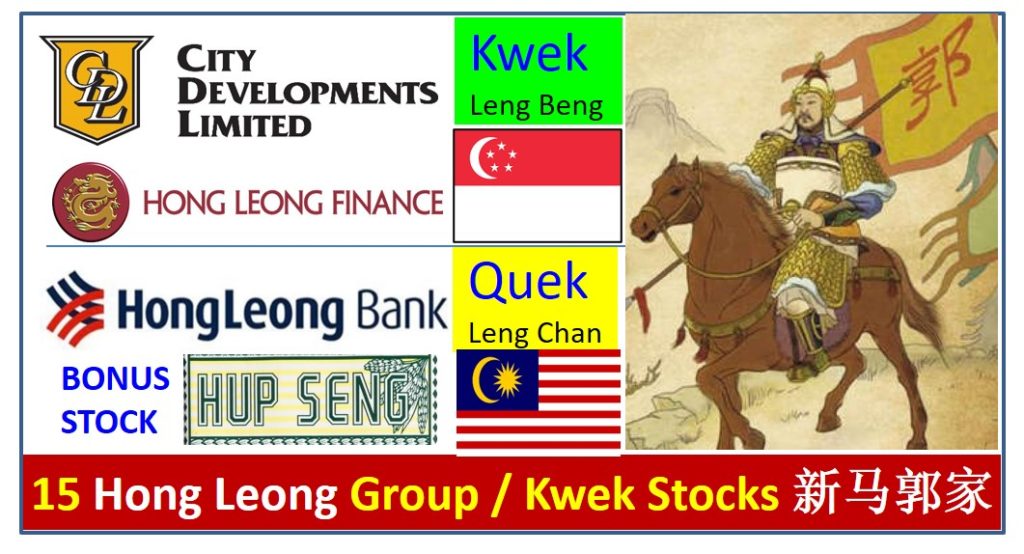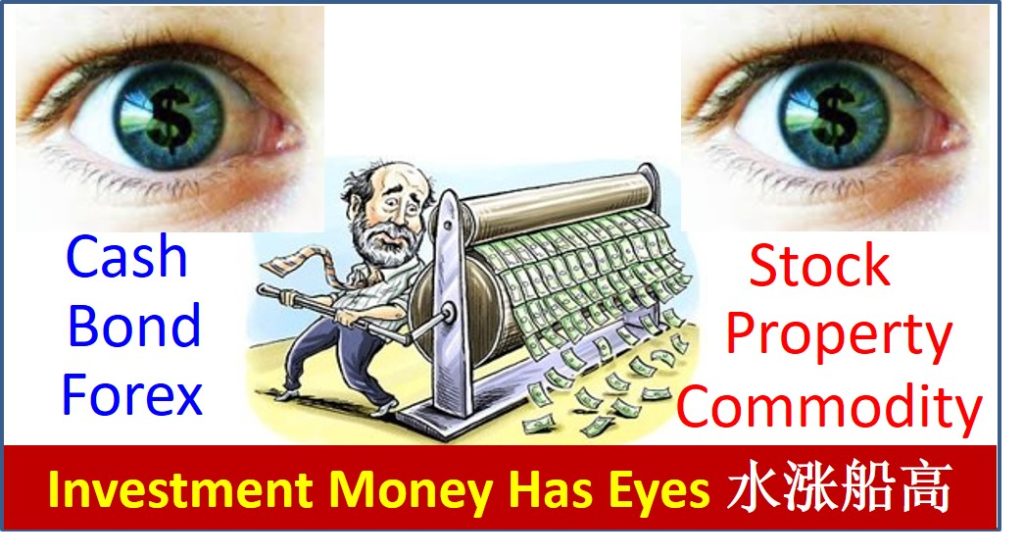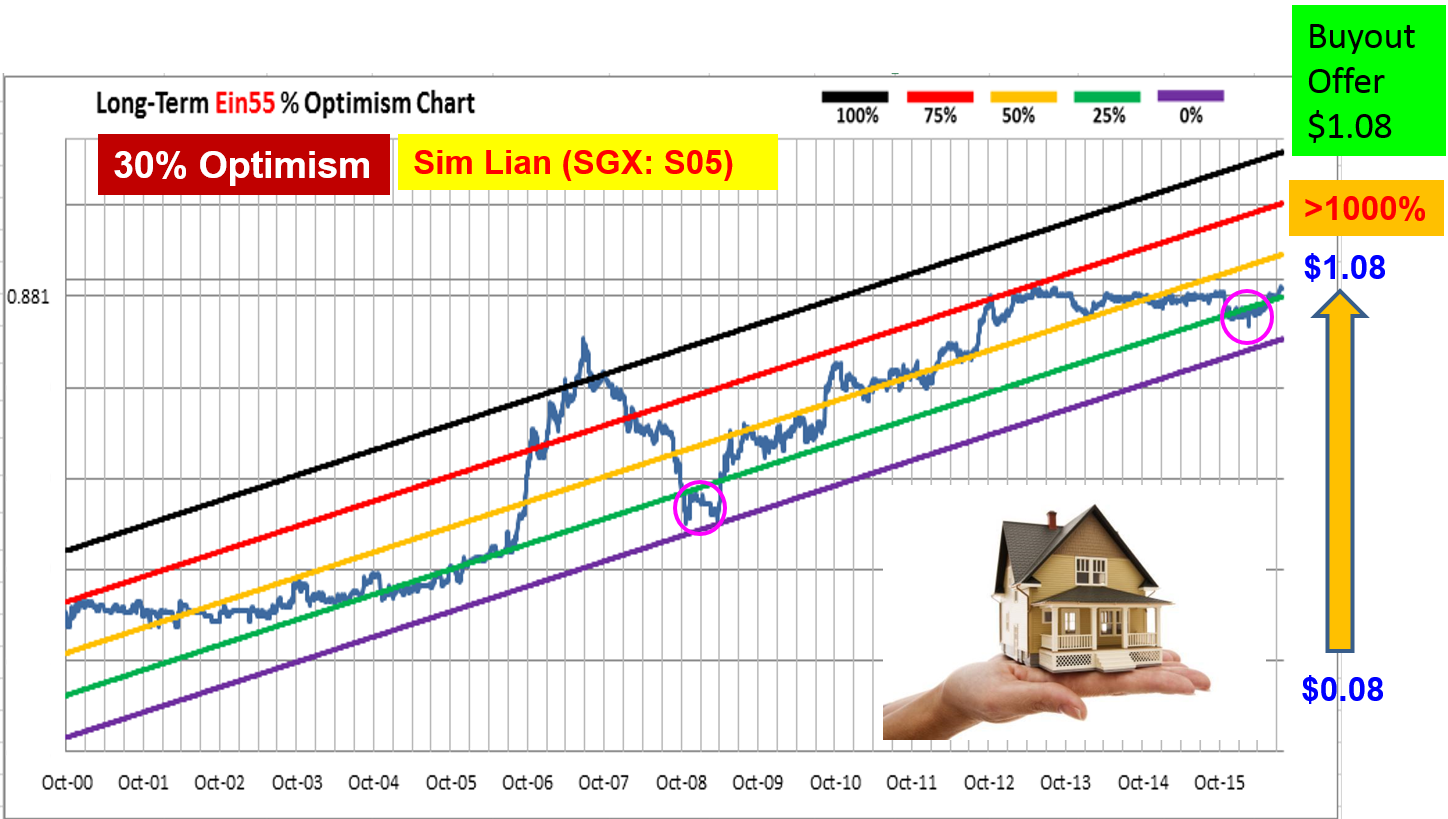
Hong Leong Group is established by Kwek/Quek family in Singapore and Malaysia. They are influential in both banking/finance and property/hospitality sectors. Learn from Dr Tee on how to position in these 15 Kwek family stocks, 5 from Hong Leong Singapore (Kwek Leng Beng) and 8 from Hong Leong Malaysia (Quek Leng Chan). There are 2 surprise bonus giant stocks waiting in between the article to reward patient reader, from another unrelated “Kwek” family. There are also a few other bonus examples, read every word in this article which could reward reader in future when taking the right action.
Kwek Leng Beng (Hong Leong Singapore):
1) City Developments Limited, CDL (SGX: C09) – Singapore Giant Property Stock
2) CDL Hospitality Trusts, CDLHT (SGX: J85) – Singapore Hospitality REIT
3) Hong Leong Finance, HLF (SGX: S41) – Singapore Finance Stock
4) Hong Leong Asia, HLA (SGX: H22) – Singapore Industrial Stock
5) Millennium & Copthorne, MLC (LSE: MLC) – UK Hospitality Stock
Quek Leng Chan (Hong Leong Malaysia):
6) Hong Leong Bank, HLBANK (Bursa: 5819) – Malaysia Giant Bank Stock
7) Hong Leong Finance Group, HLFG (Bursa: 1082) – Malaysia Giant Finance Stock
8) Hong Leong Industries, HLIND (Bursa: 3301) – Malaysia Giant Industrial Stock
9) GuocoLand Malaysia, GUOCO (Bursa: 1503) – Malaysia Property Stock
10) GuocoLand Limited (SGX: F17) – Singapore Property Stock
11) GL Limited (SGX: B16) – Singapore Hospitality Stock
12) Hong Leong Capital, HLCAP (Bursa: 5274) – Malaysia Investment Stock
13) Hume Industries, HUMEIND (Bursa: 5000) – Malaysia Cement Stock
Bonus Stocks from Another “Kwek” Family (hidden in between article)
14) Bonus Stock No 1 – Malaysia Giant F&B Growth Dividend Stock
15) Bonus Stock No 2 – Malaysia Giant Plantation Growth Dividend Stock
Kwek Leng Beng and Quek Leng Chan are actually cousin (堂兄弟) under Kwek family, their fathers are siblings, originally from Fujian of China. Why they don’t share the same family name in English, Kwek vs Quek? Well, it is quite common in older generation (both of the Hong Leong Groups Chairmen are nearly 80 years old, born around World War II time) in Singapore and Malaysia, even the surname is the same in Chinese (郭) but the possible miscommunication between the persons who reported (verbally say) and registered (listen with sounds like, then write in own way…) may result in difference in English name on birth certificate, even within the same family.
In Year 1965, Singapore and Malaysia split into 2 countries and Hong Leong Group was also divided into 2 groups. Quek Leng Chan decided to start a new business world in Malaysia with family fund while other Kwek family members (including Kwek Leng Beng) chose to stay in Singapore. Due to this historical national event, now we have 2 different Hong Leong groups in 2 countries with independent businesses. Of course, in modern world now, there is no limit in border, business could reach any country globally. Here, Dr Tee will comment on each of the Kwek/Quek family stocks.
Kwek Leng Beng (Hong Leong Singapore)
For Kwek Leng Beng (Hong Leong Singapore), the most famous stock is City Developments Limited, CDL, a giant property stock in Singapore, also 1 of 30 STI component stocks. CDL is the second largest property developer in Singapore, performance is close to another property giant stock (largest property developer in Singapore and Asia), CapitaLand (SGX: C31). Both CDL and CapitaLand are typical blue chip stocks, slower growth but stable (property), more suitable for positioning as a midfielder stock, aiming for moderate capital gains and dividend incomes over time. For investors who aim for higher growth, then both slower giant stocks may not be ideal. An ideal giant stock may not need to be large in size but has to strong in business with growth, more importantly, aligning with unique personality of individual investor.
CDL Hospitality Trusts, CDLHT, is a REIT with reasonable business fundamental (before Coronavirus crisis) but more for dividend investing, although recent Coronavirus crisis has helped to push up dividend yield to about 10% after huge correction in share price, the regular dividend payout may not be sustainable in Year 2020 due to deep impact of COVID-19 on tourism which affects the hotel business. Hong Leong Finance has reasonably good business fundamental but mainly for consideration for dividend investing (read further to the end, bonus stock is a better choice for dividend investing). Hong Leong Asia is a weak stock and Millennium & Copthorne (listed in LSE of UK) are related to hotel business in crisis, may not be considered.
Quek Leng Chan (Hong Leong Malaysia)
For Quek Leng Chan (Hong Leong Malaysia), there are more giant stocks (based on Dr Tee criteria), the best would be Hong Leong Bank, a Malaysia giant bank stock, comparable with another biggest bank giant stock, Public Bank (Bursa: 1295). Public Bank owner is also the Top 10 richest person in Malaysia, “Teh” Hong Piow (郑鸿标), the surname in English is also another variation from Dr “Tee” surname (郑) and more popular “Tay” in Singapore, but from different families. Both Hong Leong Bank and Public Bank are the few remaining private banks with excellent management (but from older generation, success plan could be a concern) in Malaysia which survive decades of merging and acquisition by government linked banks. Although Public Bank is not the “Bonus Stock” here but readers may want to consider together with Hong Leong Bank when planning for bank stocks, both are equally good, but Public Bank is bigger in size (No 3 largest bank in Malaysia).
Hong Leong Finance Group is another giant finance stock in Malaysia, excellent business performance is comparable with Hong Leong Bank. An investor may only need to consider 1 giant stock from Hong Leong groups of Kwek/Quek family, so that limited capital may be diversified with lower risks to more businesses, sectors and countries. Hong Leong Industries are slightly lower performance than both giant stocks (Hong Leong Bank and Hong Leong Finance Group), having growing business as well.
Guoco Group has 3 stocks listed, acceptable business but may not worth investing: GuocoLand Limited (SGX: F17) – Singapore Property Stock (No 5 largest property developer in Singapore), GL Limited (SGX: B16) – Singapore Hospitality Stock, GuocoLand Malaysia (Bursa: 1503) – Malaysia Property Stock. Remaining 2 stocks may not worth consideration: Hong Leong Capital, HLCAP (Bursa: 5274) – Malaysia Investment Stock (suspended due to public shareholding <25%) and Hume Industries, HUMEIND (Bursa: 3301) – Malaysia Cement Stock which has weak performance, could be due to bearish property construction industry in Malaysia.
Bonus Stock No 1: Hup Seng (Bursa: 5024) – Malaysia F&B Growth Dividend Stock
Sounds confusing of Kwek vs Quek? Another little giant F&B stock in Malaysia, Hup Seng (Bursa: 5024), biscuit family from a small town, Batu Bahat of Johor, Malaysia also share the same surname of Kwek (郭) in Chinese but all 3 brothers (founders) have different surnames spelled in English: Kuo Choo Song, Keh Chu Koh and Kerk Chiew Siong, same reason as above (also same generation as Hong Leong leaders). This difference won’t stop the family to develop Hup Seng from a tiny biscuit factory into a listed public company in Bursa. In fact, Hup Seng has growing business with steady cash flow (products such as “ping pong” Marie biscuit and crackers are popular in Malaysia and Singapore). Hup Seng is actually a growth dividend stock (nearly no debt for past decade), share price is only corrected by 20% during recent global stock crisis during pandemic and quickly recover, now even higher before the Coronavirus crisis. This bonus stock is a good example of a giant stock does not need to be big in size.
Bonus Stock No 2: Hap Seng (Bursa: 3034) – Malaysia Plantation Growth Dividend Stock
Be careful when searching for Hup Seng stock, don’t mix up with another giant stock (Bonus No 2), Hap Seng (Bursa: 3034) with slightly different “surname” but it is a plantation stock, may also be positioned for growth dividend investing. So, regardless which “Kwek” or which “Hup/Hap” Seng stock, as long as it is a giant stock, then it could potentially reward the investors with growing business but patience is required.
In fact, there are 3 “Kwek” families from the Top 10 richest families in Singapore and Malaysia. Besides Kweks from Hong Leong Group (Kweks of Hup Seng are too small) are in the Forbes’ list, there are Kuok Family (Robert Kuok – the richest person in Malaysia and nephew Kuok Khoon Hong – Wilmar Chairman, No 9 richest person in Singapore) and Kwee Family (Pontiac Land Group), No 8 richest family in Singapore. Perhaps these could be future articles for Dr Tee.
Based on Forbes’ wealth estimation, Quek Leng Chan (Hong Leong Malaysia) has about US$9 Billion net worth, about 3 times more than cousin, Kwek Leng Beng (Hong Leong Singapore). The difference in wealth (assuming starting fund is close 50 years ago) could be due to more giant growth stocks in Hong Leong Malaysia, resulting in faster growth in wealth over the past decades for Quek Leng Chan.
A person or family could become very rich, business (private company) itself may be insufficient, usually is supported by at least a giant stock, then wealth could become more than 10 or 100 times over time after public listing. A convincing example is the world richest person, Jeff Bezos with US$143 Billion net worth (more than 10 times of entire Hong Leong Group of 2 countries), becoming very rich because of Amazon stock (NASDAQ: AMZN), not just because of earning in business (Price Earning ratio, PE is 102, implying he could multiply his wealth 102 times through stock market). Of course, there are more examples, including Mark Zuckerberg, founder of Facebook, No 6 richest person in the world, net worth of $63 Billion is only possible after Facebook is listed (NASDAQ: FB) with support of growing business. Both Amazon and Facebook businesses may not be recession proof but certainly “Coronavirus pandemic proof”, with more lockdown globally, users could be even more, strong share price performance is a recognition of high growth stock.
=====================================
There are 30 STI index component stocks including City Development of Kwek Family (investor has to focus only on giant stocks for investing):
DBS Bank (SGX: D05), Singtel (SGX: Z74), OCBC Bank (SGX: O39), UOB Bank (SGX: U11), Wilmar International (SGX: F34), Jardine Matheson Holdings JMH (SGX: J36), Jardine Strategic Holdings JSH (SGX: J37), Thai Beverage (SGX: Y92), CapitaLand (SGX: C31), Ascendas Reit (SGX: A17U), Singapore Airlines (SGX: C6L), ST Engineering (SGX: S63), Keppel Corp (SGX: BN4), Singapore Exchange (SGX: S68), Hongkong Land (SGX: H78), Genting Singapore (SGX: G13), Mapletree Logistics Trust (SGX: M44U), Jardine Cycle & Carriage (SGX: C07), Mapletree Industrial Trust (SGX: ME8U), City Development (SGX: C09), CapitaLand Mall Trust (SGX: C38U), CapitaLand Commercial Trust (SGX: C61U), Mapletree Commercial Trust (SGX: N2IU), Dairy Farm International (SGX: D01), UOL (SGX: U14), Venture Corporation (SGX: V03), YZJ Shipbldg SGD (SGX: BS6), Sembcorp Industries (SGX: U96), SATS (SGX: S58), ComfortDelGro (SGX: C52).
There are 30 Malaysia Bursa KLCI index component stocks including Hong Leong Bank and Hong Leong Finance Group of Quek Family (investor has to focus only on giant stocks for investing):
CIMB (Bursa: 1023) CIMB GROUP HOLDINGS BERHAD, DIALOG (Bursa: 7277) DIALOG GROUP BERHAD, DIGI (Bursa: 6947) DIGI.COM BERHAD, GENM (Bursa: 4715) GENTING MALAYSIA BERHAD, GENTING (Bursa: 3182) GENTING BERHAD, HAPSENG (Bursa: 3034) HAP SENG CONSOLIDATED BERHAD, HARTA (Bursa: 5168) HARTALEGA HOLDINGS BERHAD, HLBANK (Bursa: 5819) HONG LEONG BANK BERHAD, HLFG (Bursa: 1082) HONG LEONG FINANCIAL GROUP BERHAD, IHH (Bursa: 5225) IHH HEALTHCARE BERHAD, IOICORP (1961) IOI CORPORATION BERHAD, KLCC (Bursa: 5235SS) KLCC PROPERTY HOLDINGS BERHAD, KLK (Bursa: 2445) KUALA LUMPUR KEPONG BERHAD, MAXIS (Bursa: 6012) MAXIS BERHAD, MAYBANK (Bursa: 1155) MALAYAN BANKING BERHAD, MISC (Bursa: 3816) MISC BERHAD, NESTLE (Bursa: 4707) NESTLE MALAYSIA BERHAD, PBBANK (Bursa: 1295) PUBLIC BANK BERHAD, PCHEM (Bursa: 5183) PETRONAS CHEMICALS GROUP BERHAD, PETDAG (Bursa: 5681) PETRONAS DAGANGAN BHD, PETGAS (Bursa: 6033) PETRONAS GAS BERHAD, PMETAL (Bursa: 8869) PRESS METAL ALUMINIUM HOLDINGS BERHAD, PPB (Bursa: 4065) PPB GROUP BERHAD, RHBBANK (Bursa: 1066) RHB BANK BERHAD, SIME (Bursa: 4197) SIME DARBY BERHAD, SIMEPLT (Bursa: 5285) SIME DARBY PLANTATION BERHAD, TENAGA (Bursa: 5347) TENAGA NASIONAL BHD, TM (Bursa: 4863) TELEKOM MALAYSIA BERHAD, TOPGLOV (Bursa: 7113) TOP GLOVE CORPORATION BHD.
Readers may feel that the riches are too far to reach. In fact, retail investors may leverage on these rich families or individual, investing in their giant stocks at lower optimism prices during global financial crisis when others are fearful (mastery of investment clock), while their strong businesses continue to grow during the crisis, eventually could reward the investors with capital gains when crisis is over and others are greedy this time.
Drop by Dr Tee free 4hr investment course to learn how to position in global giant stocks with 10 unique stock investing strategies, knowing What to Buy, When to Buy/Sell.
Learn further from Dr Tee valuable 7hr Online Course, both English (How to Discover Giant Stocks) and Chinese (价值投资法: 探测强巨股) options, specially for learners who prefer to master stock investment strategies of over 100 global giant stocks at the comfort of home.
You are invited to join Dr Tee private investment forum (educational platform, no commercial is allowed) to learn more investment knowledge, interacting with over 9000 members.




